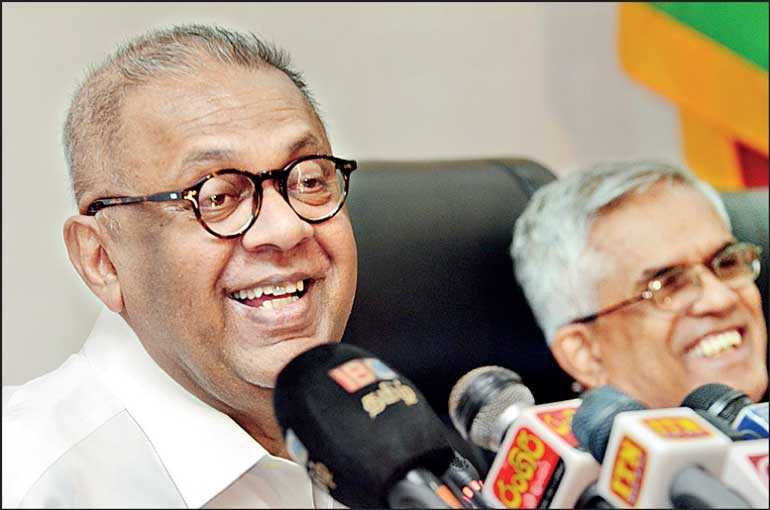Monday Feb 16, 2026
Monday Feb 16, 2026
Friday, 4 October 2019 00:30 - - {{hitsCtrl.values.hits}}

By Charumini de Silva
Finance Minister Mangala Samaraweera yesterday defended the Government’s debt management policy, insisting that they removed elements that caused weakening of the fiscal system, with the introduction of a farsighted mechanism to strengthen the sources of public revenue and loan management.
Responding to former President and Finance Minister Mahinda Rajapaksa’s allegations that the Government’s debt crisis has reached a “critical stage”, he pointed out that the current Government was compelled to spend more than the amount of loans it borrowed, to repay the large amount of commercial foreign borrowings obtained by the previous regime, and their surging interests.
The previous Gover-nment has obtained a huge amount of foreign loans under commercial basis at a very high interest rate.
Opposition Leader Mahinda Rajapaksa, in a communiqué, said that this Government obtained loans to secure its power during the last four-and-a-half year period. Many facts in that communiqué are distorted beyond the truth, Samaraweera told journalists yesterday.
He claimed that for the first time in history, Sri Lanka began to obtain commercial loans at a high interest rate under International Sovereign Bonds during the Mahinda Rajapaksa Government in 2007, and that most such loans obtained at very high interest are maturing between 2019 to 2022.
Samaraweera also pointed out that the repayment of loans obtained for the Hambantota Port, the Mattala Airport, and the Expressways began in 2015, and the current Government has been servicing those debts annually, where colossal amounts were borrowed by the previous regime.
“The outstanding payments for projects which had begun haphazardly from 2011 were accumulated for years, and after we took office, the Government paid Rs. 140 billion in 2015 and 2016. The improper fiscal control that prevailed during the Rajapaksa regime had saddled this country’s economy with a colossal debt by 2015, he added.
He also charged that the projects developed by obtaining colossal amounts of borrowings during the Rajapaksa era neither originated any income, nor did they benefit the public.
Samaraweera emphasised it was only during this regime that they were able to pave the way for proper management of public finance, and as a result, the Government was able to maintain fiscal policy efficiently, while doubling the public revenue in the country.
“As a result of better economic management, our Government was able to record a surplus in the primary account in 2017, for the first time since the 1950s. By further strengthening this surplus in the primary account, we were able to prepare a fiscal system, which enabled it to use the Government revenue to contribute to debt-servicing for the first time in history,” he stressed.
Treasury Secretary Dr. R.H.S. Samaratunga also said that plans are underway to establish a debt management unit under the Finance Ministry soon, although the Central Bank is already proceeding with a debt management strategy approved by the Government.
When it was pointed out that some of the facts that the former Finance Minister Rajapaksa was referring to were true, Samaraweera dismissed the allegations.
“(Rajapaksa’s) figures may be true, but the interpretation of the figures are totally off the mark, that is what I am trying to say. Basically, we are carrying the baggage of the Rajapaksas, as a responsible Government. We are dealing with the debt management of the country in a very systematic way,” he added.
The Minister was, however, unable to provide a breakdown of borrowings by project during the past four years of this Government.